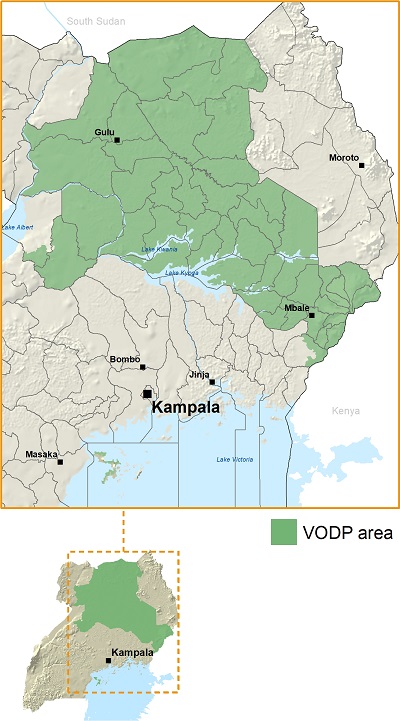Vegetable Oil Development Project
IFAD Asset Request Portlet
Agrégateur de contenus
Vegetable Oil Development Project
The project contributed to the establishment of a Vegetable Oil Development Fund for investment in production and cooperated with the Government to create the Vegetable Oil Development Council, a consultative body. The Vegetable Oil Development Fund supported vegetable oil production in general and helped local institutions build up their capacity to coordinate and conduct research, promote further investments and development, and implement measures for natural resources management.
Growth in traditional vegetable oil production has stimulated private development, as demonstrated by the increased number of mills in the northern part of the country, from six at project start-up to more than 30 today. This is the first IFAD-funded project to have attracted substantial investment from a private-sector partner. With the collaboration of that partner, oil palm production has been introduced to Uganda and a modern, environmentally-friendly palm oil built within the country.
The project encouraged participating farmers and farmers' groups to put increased earnings from their productive activities into savings. As a result, savings and credit cooperatives have been established and now finance investments in improvements and in farmer group activities.
The project has also stimulated development of the national research capacity, particularly for sunflower production, and, through its work with the Uganda National Bureau of Standards, has introduced food safety standards for traditional village-level processing. As a result of the project, household oil consumption in the production areas has increased from 2.3 kg per capita in 1998 to about 6 kg today, which is close to the 7 kg considered adequate for nutrition. IFAD took over direct supervision of the project in December 2008.
|
Brief description of the public-private partnership (PPP) The project was designed to alleviate Uganda's dependence on imported vegetable oils by supporting the domestic production and processing of palm oil. It was the first example of a PPP in Uganda. In its first phase the project negotiated a tripartite collaboration between the government, a private company and smallholder farmers, to establish a plantation and processing units for the domestic production of vegetable oil on Bugala Island. The partnership was reinforced through mutual dependence: the palm oil mill provides a secure market for smallholder producers who guarantee a supply of raw material for processing. In the second phase of the project the same collaborative business model is repeated in a new location, and also extends to oil seed production, in order to show how similar tripartite partnerships can be forged with other value chains. Role of IFAD-supported project in the PPP The IFAD-supported project financed the smallholder oil palm development through loans made to the government, designed and brokered the tripartite business model, and provided financial and technical support for the development of the smallholder outgrower schemes. It also helped establish a trust to link the smallholder farmers to the private company (OPUL - see description below) and mediate on their behalf. Role of private sector A conglomerate of private companies set up the nucleus estate and palm oil mill and refinery, and established Oil Palm Uganda Limited (OPUL), to manage the plantation and processing units. Smallholders grow and sell their crops to OPUL at a mutually agreed price. OPUL provides a ready market and complete support package to farmers, including seedlings, inputs, support with land preparation and technical advice. Smallholders have a 10 per cent share in OPUL. Role of government The government provided land on lease to the private sector partner to establish a nucleus estate, and also made funds available as start up loans to smallholder farmers, with flexible repayment conditions. The government also made improvements in local infrastructure and services – such as district roads and ferry transport. How many rural people benefited? More than 1,500 smallholder farmers are directly involved in production, while 2,000 are employed at the nucleus estate and 500 as field labourers on smaller plantations. What are benefits to smallholder farmers?
Other impacts
|
Source: IFAD
